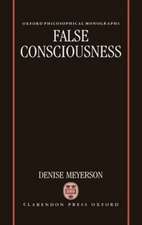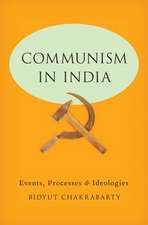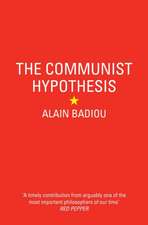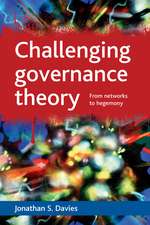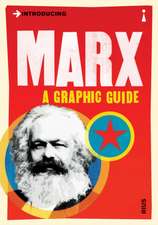Marx and the New Individual: Routledge Library Editions: Marxism
Autor Ian Forbesen Limba Engleză Hardback – 8 apr 2015
Din seria Routledge Library Editions: Marxism
- 17%
 Preț: 259.98 lei
Preț: 259.98 lei - 16%
 Preț: 241.15 lei
Preț: 241.15 lei - 17%
 Preț: 259.98 lei
Preț: 259.98 lei - 34%
 Preț: 680.31 lei
Preț: 680.31 lei - 18%
 Preț: 995.24 lei
Preț: 995.24 lei - 16%
 Preț: 241.15 lei
Preț: 241.15 lei - 15%
 Preț: 666.63 lei
Preț: 666.63 lei - 18%
 Preț: 996.81 lei
Preț: 996.81 lei - 43%
 Preț: 172.64 lei
Preț: 172.64 lei - 18%
 Preț: 997.58 lei
Preț: 997.58 lei - 18%
 Preț: 993.69 lei
Preț: 993.69 lei - 17%
 Preț: 256.32 lei
Preț: 256.32 lei - 16%
 Preț: 241.15 lei
Preț: 241.15 lei - 17%
 Preț: 178.76 lei
Preț: 178.76 lei - 16%
 Preț: 243.90 lei
Preț: 243.90 lei - 18%
 Preț: 993.69 lei
Preț: 993.69 lei - 17%
 Preț: 247.40 lei
Preț: 247.40 lei - 18%
 Preț: 1053.22 lei
Preț: 1053.22 lei - 18%
 Preț: 1271.79 lei
Preț: 1271.79 lei - 18%
 Preț: 1278.04 lei
Preț: 1278.04 lei - 16%
 Preț: 241.15 lei
Preț: 241.15 lei - 34%
 Preț: 7528.09 lei
Preț: 7528.09 lei
Preț: 697.08 lei
Preț vechi: 820.10 lei
-15% Nou
Puncte Express: 1046
Preț estimativ în valută:
133.50€ • 137.55$ • 111.83£
133.50€ • 137.55$ • 111.83£
Carte tipărită la comandă
Livrare economică 24 februarie-10 martie
Preluare comenzi: 021 569.72.76
Specificații
ISBN-13: 9781138885943
ISBN-10: 1138885940
Pagini: 268
Dimensiuni: 156 x 234 mm
Greutate: 0.57 kg
Ediția:1
Editura: Taylor & Francis
Colecția Routledge
Seria Routledge Library Editions: Marxism
Locul publicării:Oxford, United Kingdom
ISBN-10: 1138885940
Pagini: 268
Dimensiuni: 156 x 234 mm
Greutate: 0.57 kg
Ediția:1
Editura: Taylor & Francis
Colecția Routledge
Seria Routledge Library Editions: Marxism
Locul publicării:Oxford, United Kingdom
Public țintă
Postgraduate and UndergraduateCuprins
Part 1. The Individual, Political Theory and Marx’s Thought 1.1. The Individual in Humanism and Theoretical Anti-humanism 1.2. Individualism and Social Theory 1.3. Marx and Modes of Individualism 1.4. Human Nature, Autonomy and History Part 2. The Individual and Marx’s Theory of Change 2.1. Sources of Social Change 2.2. Human Nature and History 2.3. Thinking About Human Nature 2.4. Social Change and Individuality Part 3. Pre-Capitalist Societies and the Absence of Individualism and Individuality 3.1. Feudalism and the Individual 3.2. Feudalism and Change 3.3. The Feudal Individual Part 4. Individuality in Capitalist Society 4.1. The Transition from Feudalism to Capitalism 4.2. History, Nature, and Early Capitalism 4.3. The Placement of Marx’s Critique 4.4. Development: Human Nature and Capitalism 4.5. Production 4.6. Social Relations 4.7. Capitalism, Individualism and Individuality 4.8. Bourgeois Individuality 4.9. Proletarian Individuality 4.10. Individuality and Change Through Capitalism Part 5. The Individual Under Communism 5.1. Method in Communism 5.2. Communism as the End of Classes 5.3. Individuals and Nature in Communism 5.4. The Character of Communist Individuality 5.5. Exchange, Production and the Universal Individual 5.6. On Being an Individual 5.7. Wealth and Communist Individuality
Descriere
In what is the first sustained analysis of Marx’s attitude to the puzzle of the individual in history and society, this book, first published in 1990, challenges received views on the importance of class analysis and the place of a theory of human nature in Marx’s thought. The radical possibilities of individual agency in society are explored within a Marxian framework, and without recourse to the current fashions of methodological individualism or rational choice theory. In the context of the apparent antagonism between collectivist and individualist approaches to political explanation and social change, the author establishes that a ‘New Individual’, of singular importance for the understanding of contemporary society, can be identified. For the first time, the Grundrisse provides the basis of a major analysis of Marx’s thoughts on the individual. By illustrating the nature of the connections between collective existence and individual experience, Ian Forbes makes an important contribution towards the revitalization of socialist thought. He also develops a valuable counterpoint to rational actor models of politics and liberal theories of justice alike, by establishing the importance of a political theory that values human agency as much as it understands social and historical processes.


